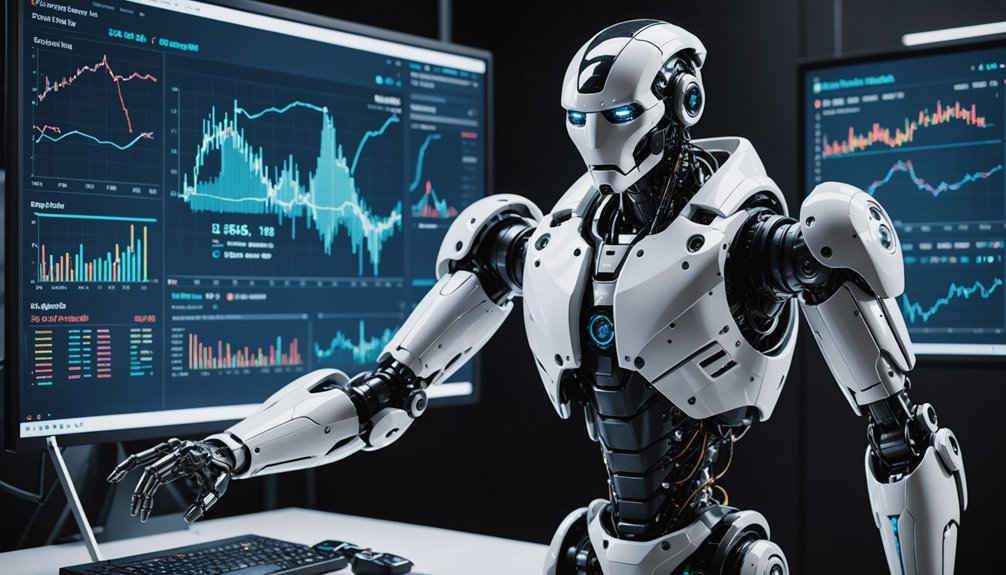AI-driven SEO is indeed a game-changer in digital marketing. Its role encompasses improved keyword research, content creation, technical improvements, and understanding of user intent with delicate precision and high efficiency. Using AI tools, keywords can be systematically selected, content optimization upgraded, and user interactions interpreted accurately. Moreover, AI-driven SEO enables technical advancements, including efficient site indexing, continuous monitoring, and automated audits. Progressively, AI is shifting focus from exact keywords to contextually relevant, engageable content. AI’s predictive abilities also enable proactive strategies for potential site performance issues. Uncover further how AI bolsters competitiveness in the digital arena, marking a new era in SEO.
Key Takeaways
- AI revolutionizes SEO by automating keyword research, identifying high-conversion long-tail keywords, and predicting future search trends.
- Tools powered by AI automate content creation and optimization, enhancing readability, engagement, and SEO rankings.
- AI enhances technical SEO, improving site crawl efficiency, automating outreach for link building, and maintaining website health.
- AI understands user intent and behavior, shifting focus to contextually relevant content and enabling personalized experiences based on user data.
- AI’s predictive capabilities aid in proactive SEO strategy development, balancing AI efficiency with human judgment and enhancing brand competitiveness.
Harnessing AI for Enhanced Keyword Research
In the realm of online marketing, utilizing AI for enhanced keyword research has emerged as a game-changing strategy. AI-powered tools leverage vast datasets and search patterns to identify pertinent keywords, providing exceptional insights into keyword popularity, competition levels, and user intent. They also enable businesses to adopt a multichannel approach to their marketing efforts, analyzing customer behavior across various platforms for more targeted, effective outreach.
This granular analysis uncovers long-tail keywords and specific search phrases with higher conversion rates that are less competitive, providing a unique competitive edge. Furthermore, AI tools unveil competitor keyword strategies, enabling marketers to identify gaps and seize opportunities to differentiate their content.
Predictive analysis and authentic-time updates based on current data patterns and changing search patterns, respectively, equip marketers with strategic foresight, ensuring their content remains competitive. This adaptability is essential in the constantly changing online environment.
The efficiency of AI tools, characterized by user-friendly interfaces and quick navigation, accelerates the keyword research process, conserving valuable time and resources. Moreover, they facilitate the implementation of AI-driven keyword strategies, suggesting variations based on user intent and search volume and estimating the difficulty of ranking for specific keywords. This strategic, detail-oriented approach enables marketers to liberate their content creation process, ensuring ongoing relevance and visibility. Also, these tools are no longer limited to large corporations; they are now accessible to all users, removing the need for a Google Ads account (Free Access).
AI and Improved Content Optimization
Utilizing advanced AI technologies in content optimization has transformed the world of digital marketing. By automating content creation and analysis, AI tools can efficiently produce high-quality, SEO-friendly content tailored to user intent. They employ natural language generation algorithms to emulate person-like text, offering content ideas and even rewriting for improved readability and engagement.
AI also assists in creation and analysis. It identifies content gaps, analyzes keyword usage, and assesses the quality of content, providing valuable insights for improvement. AI also conducts competitor analysis, revealing high-performing content and strategies for businesses to imitate.
Strategically, AI is instrumental in content optimization techniques. Predictive analytics anticipate changes in search engine algorithms, while continuous monitoring allows for real-time content performance tracking. AI’s ability to analyze A/B test results and create keyword clusters further optimizes content for a broad spectrum of related terms. Moreover, by integrating sales automation, AI can streamline operations and boost content productivity by targeting repetitive tasks for automation and enhancing business operations (Efficiency Through Technology).
Moreover, AI tools like Surfer SEO and Jasper AI can offer data-driven insights and generate tailored content across various niches and formats, promoting better search rankings (Key AI Tools).
However, to truly utilize AI’s potential, it should be combined with human creativity, focus on quality over quantity, and be used ethically. As AI continues to evolve, digital marketers must stay abreast of the latest trends, ensuring content remains optimized, engaging, and pertinent.
Technical SEO Enhancements Through AI

Beyond content optimization, AI’s influence extends to technical SEO, demonstrating versatility and extensive utility in digital marketing. AI-enhanced crawling and indexing techniques optimize site crawl efficiency, ensuring effective indexing and ranking by prioritizing essential pages for search engine bots. Furthermore, AI identifies and validates structured data implementation, providing a thorough analysis of large data sets to pinpoint technical issues.
AI’s predictive capabilities, such as error detection, anticipate potential issues that could impact site performance. This enables marketers to develop proactive technical SEO strategies, avoiding significant disruptions. Continuous monitoring and automated audits further maintain a healthy website by identifying and fixing technical issues like broken links and crawl errors.
AI also plays a vital role in link-building and analysis. Evaluating link quality and automating outreach streamlines the process of identifying potential link-building opportunities. AI-driven predictive link building informs strategies, predicting which links are likely to drive traffic and improve search engine rankings. Additionally, AI tools analyze site speed and performance metrics, offering actionable insights for further improvements (performance metrics analysis). Moreover, AI’s ability to streamline and automate repetitive tasks can lead to an efficiency improvement of 10-15% (efficiency improvements).
AI’s Role in Understanding User Intent
Artificial intelligence in SEO extends beyond technical enhancements to analyzing and understanding user search behavior. By leveraging advanced machine learning algorithms, AI can interpret the intent behind search queries, delivering more accurate and contextually relevant results. This evolution shifts the focus of SEO from targeting specific keywords to creating content that aligns with user intent, fostering better engagement and improved outcomes. Additionally, AI automates repetitive tasks, such as data entry, freeing up resources to concentrate on strategic activities like crafting high-quality, user-focused content.
Decoding User Search Behavior
As we investigate more deeply into the era of AI-driven SEO, a significant aspect to reflect on is the role of AI in understanding and decoding user search behavior. This involves identifying keywords and intent, analyzing user behavior, adapting to AI-driven search platforms, and predicting future search trends and behaviors.
AI tools, fueled by natural language processing (NLP), analyze user search queries to identify keyword patterns and intent. This includes understanding the contextual nuances of search queries and predicting future search trends based on historical data and industry movements. These insights are invaluable for crafting targeted content and strategic SEO planning.
Analyzing user behavior is another vital application of AI in SEO. AI interaction logs and immediate data help identify user patterns, preferences, and challenges, enhancing user experience by delivering content that matches intent and context.
The advent of AI search engines like ChatGPT and Google’s SGE necessitates adapting SEO strategies. Understanding user interaction with conversational AI models is paramount for effective SEO. Finally, AI’s predictive capabilities enable proactive SEO strategy development, identifying emerging search trends and optimizing content for future popular keywords.
Moreover, by embracing AI tools for SEO, small enterprises can achieve a higher level of precision in their strategies, which ensures a greater return on investment (ROI) by improving customer engagement and conversion rates (AI Marketing Tools and Strategies).
Personalizing Content Experiences
Exploring the realm of tailored content experiences, artificial intelligence plays a crucial role in understanding and utilizing user intent for strategic SEO planning. AI tools analyze complex data points in real time to comprehend individual queries and preferences and provide customized content. By incorporating contextual information like location and device and recognizing behavioral patterns, AI predicts future preferences and improves personalization.
AI technologies, such as predictive analytics, natural language processing, and generative AI, contribute to customization. They forecast behaviors, interpret human language, generate authentic content, and integrate data from diverse sources to offer automated customization.
Examples of AI customization range from personalized social media feeds and e-commerce recommendations to dynamic content and chatbots. AI guarantees consistent, tailored experiences across multiple channels.
In the same vein, sales automation tools, leveraging AI and machine learning, are significantly boosting sales efficiency by optimizing high-value tasks and strategic engagements, thus transforming the traditional sales process.
AI-driven customization offers numerous advantages, including improved customer engagement, increased efficiency, enhanced conversion rates, and a competitive advantage. Furthermore, AI’s machine learning capabilities enable continuous optimization of customization efforts, thereby boosting customer satisfaction. Consequently, AI’s role in tailoring content experiences is instrumental in shaping the future of SEO.
Boosting Efficiency and Productivity With AI

The integration of AI in SEO strategies presents unmatched opportunities for automating routine tasks, enabling businesses to focus on strategic areas of growth. AI’s intelligent capability to improve content through actual-time analysis and data-driven insights can markedly boost natural traffic and conversion rates. Modern automation tools can also help manage missed calls efficiently, thereby improving customer satisfaction and potential sales. By incorporating AI into SEO strategy, businesses can utilize vast amounts of data, drive targeted content creation, and guarantee a streamlined, efficient approach to digital marketing. Additionally, with the use of AI-driven keyword research tools like Twinword and CopyAI, businesses can effectively identify and utilize semantic keywords for enhanced traffic and conversions, ultimately improving their SEO performance (Keyword Research Tools).
Automating Routine SEO Tasks
In a constantly changing online environment, automating routine SEO tasks stands as a key strategy for organizations seeking to improve their efficiency and productivity. AI-driven tools are now capable of streamlining keyword research, general SEO tasks, and even technical SEO tasks, offering organizations the freedom to focus on strategic activities.
| SEO Task | AI Strategy | Outcome |
|---|---|---|
| Keyword Research | AI tools identify relevant keywords, predict future trends, and analyze competitor strategies. | Enhanced keyword strategies for improved ranking. |
| General SEO Tasks | AI automates site audits, performance tracking, and content optimization. | Improved site health and user experience; minimized risk of individual error. |
| Technical SEO Tasks | AI optimizes page load speed, mobile-friendliness, and secure connections. | Better user experience and improved SEO rankings. |
These AI-driven tools not only increase efficiency and productivity but also considerably reduce the risk of individual error. Fundamentally, automating routine SEO tasks with AI is a game-changing strategy for organizations aiming to stay competitive in the online arena. It is a clear demonstration of how AI is reshaping traditional SEO tactics, taking them to the next level of efficiency and effectiveness. Moreover, the use of AI in automating SEO tasks ensures consistent optimization efforts, making it a reliable solution for businesses.
Intelligent Content Improvements
Building on the concept of automating routine SEO tasks, we now turn our attention to the role of AI in intelligent content improvements. AI’s functionality in optimizing content is irrefutable; it provides practical insights by analyzing content for keyword relevance, structure, and content gaps. Tools like SEOwind and Frase.io utilize AI to generate optimized content outlines, enhancing SEO effectiveness.
AI’s role in enhancing content quality is similarly significant. It produces well-structured articles adhering to online writing best practices, evaluates content length, readability, and keyword placement, and customizes content based on user behavior. SEOwind, an AI-powered platform, creates high-quality, extensive content based on thorough research and analysis.
AI’s utility extends to content creation, assisting in content structuring, optimization, and even automating content generation. It analyzes competitors’ content to provide strategy improvements, streamlining content creation and delivery.
AI in SEO Strategy
Undeniably, AI has emerged as a game-changer in SEO strategy, boosting efficiency and productivity through automation. AI integration in SEO offers key benefits such as immediate insights, adaptable reports, and the automation of tedious tasks. This streamlining of workflows allows for more time dedicated to strategic planning and creative content development.
In the domain of keyword research and analysis, AI’s precision and advanced data analysis capabilities are unmatched. It can identify relevant keywords, assess competitiveness, and even predict performance. Additionally, AI-driven tools can provide insights into search trends and user intent, offering a competitive advantage.
Furthermore, AI plays a critical role in content optimization. It guarantees that content aligns with user intent and search engine algorithms, offers suggestions to improve existing content, and even assists in creating new content that resonates with users.
In technical SEO, AI identifies and resolves issues, conducts site audits, and optimizes performance. It also boosts site crawl efficiency and automates repetitive tasks. The result is a more efficient, effective, and forward-thinking SEO strategy.
Advantages of AI in Competitive SEO
Utilizing the power of artificial intelligence can significantly improve a brand’s SEO game, giving it a competitive edge in the increasingly crowded digital marketplace. AI’s ability to automate keyword research, analyze large volumes of data, and generate targeted content strategies allows brands to stay ahead of the competition. It also streamlines SEO processes, efficiently automates time-consuming tasks, and advances search rankings.
AI-powered tools are not just about increasing competitiveness; they also improve efficiency. By swiftly analyzing data, these tools optimize SEO processes, automate content optimization, streamline link building, and create individualized recommendations. This results in reduced time and costs, thereby freeing up resources for more strategic planning and delivery of digital content.
AI’s capabilities in terms of user experience are unmatched. It analyzes user behavior to deliver customized experiences, generates high-quality content, improves voice search optimization, and even predicts user behavior. The emphasis on E-A-T principles in AI-driven content creation further elevates trustworthiness and user engagement.
Future Trends in AI-Powered SEO

As we investigate the future trends in AI-powered SEO, it becomes evident that the landscape is rapidly changing. Tools leveraging advanced AI systems like GPT-4 and BERT are automating content creation, optimizing it for user intent, and customizing responses based on user behavior. AI-powered platforms like Search Atlas and Surfer SEO provide state-of-the-art solutions for keyword research, competitor analysis, and content optimization.
Predictive analytics, a key feature in these AI tools, is transforming the decision-making process in SEO. By analyzing large volumes of data swiftly, these tools can identify patterns and trends, enabling SEO professionals to forecast user actions and optimize their strategies accordingly.
AI-driven search engines, including ChatGPT, Perplexity, and Google’s Bard, are reshaping SEO strategies. Understanding user behavior on these platforms is critical, as AI models trained on data from diverse sources, including social media and forums, can significantly impact visibility.
One of the key trends is AI’s role in content optimization. AI-powered content creation aligns with SEO best practices and user intent, optimizing even video content for SEO by analyzing titles, descriptions, and tags. The future is clear: AI is a game-changer in SEO.
The Impact of AI on SEO Strategy
The seismic shift brought about by AI in the domain of SEO strategy is both revolutionary and far-reaching. AI’s alteration of SEO strategies has led to a significant reduction in manual labor through generative content creation and automation of repetitive tasks. AI customization and predictive capabilities have improved the user experience and the effectiveness of SEO. AI-driven data analysis and keyword research have streamlined the process of identifying relevant trends and patterns, enhancing SEO performance.
Integrating AI into SEO strategies can provide key benefits, including efficiency, scalability, improved content quality, enhanced user experience, and increased productivity. The shift from keyword stuffing to contextual content and the integration with digital media channels demonstrate AI’s impact on SEO practices.
Balancing AI efficiency with individual judgment, staying ahead of algorithm updates, focusing on page experience and conversion optimization, boosting individual creativity, and the need for continuous learning are challenges and opportunities in AI-driven SEO. To summarize, the role of AI in SEO strategy is significant and groundbreaking, leading to more effective and efficient SEO practices.
Frequently Asked Questions
How Are Affordable Ai-Powered SEO Tools for Small Businesses?
AI-powered SEO tools offer affordable options for small businesses, with free versions available and plans starting as low as $49/month. They provide cost-effective features that boost online visibility, optimize content, and improve search engine rankings.
What Is the Learning Curve for Using AI in SEO Strategies?
Due to the rapidly evolving nature of AI’s role in SEO, the learning curve for using AI in SEO strategies involves acquiring new technical skills, understanding AI-powered tools, interpreting data, and continuous learning.
Are There Any Potential Risks or Downsides to Using AI in SEO?
Yes, AI in SEO presents potential risks such as inaccurate content due to biased data, lack of personal creativity, ethical concerns, and technical limitations. Careful oversight and appropriate data inputs are essential to mitigate these challenges.
How Does AI Handle New, Emerging Keywords or Topics That Don’t Have Historical Data?
AI manages emerging keywords through genuine-time data analysis and predictive capabilities. Natural language processing allows contextual understanding, while clustering identifies related keywords. This continuous learning process refines strategies as new data becomes available.
Can AI Also Be Used to Optimize SEO for Non-English Content?
Yes, AI can optimize SEO for non-English content. It supports multiple languages, analyzes relevant keywords, adapts to cultural trends, localizes content, and conducts multi-language SEO audits, thereby enhancing non-English content visibility and user engagement.
How AI Transforms SEO at LaunchedConclusion
The advent of AI in SEO is undeniably revolutionary, revitalizing traditional techniques and transforming digital marketing terrains. The amalgamation of AI and SEO augments keyword research, content optimization, technical SEO, and understanding of user intent. Furthermore, it bolsters efficiency and productivity while offering a competitive edge. As future trends unfold, AI-powered SEO will indubitably influence strategies, instigating intelligent innovations and invigorating internet interactions. Indeed, AI-driven SEO is a game-changer, promising profound potential in the perpetually progressing digital domain.

Erik Remmel is a co-founder of Launched, a platform that helps businesses grow through AI-powered marketing, automation, and lead generation. He focuses on building scalable systems that convert cold leads into customers while streamlining operations with smart, AI-driven workflows.

